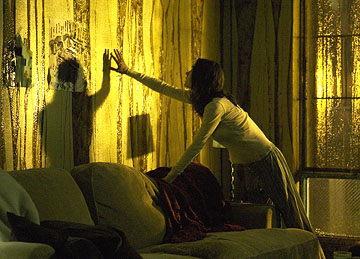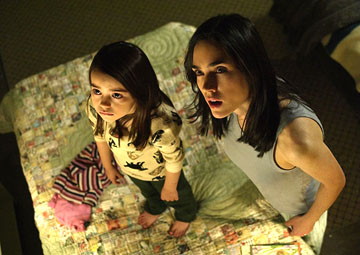

Dark Water would be more interesting if it did not feel so derivative. It combines the recent phenomenon of remaking Japanese horror films and adds the familiar ambiguity between the horror and the protagonist's potential mental imbalance. Because of this, Dark Water feels overly familiar, as if the viewer could anticipate things before they happen. The film does have the benefit of Jennifer Connelly (House of Sand and Fog, Hulk) and Brazilian director Walter Salles (The Motorcycle Diaries, Guns and Peace) contributing, but they can only work with what they have.
Screenwriter Rafael Yglesias (From Hell, Les Miserables) adapted the film from the Japanese one of the same name. The Japanese Dark Water came from the same people that made the Ringu movies, director Hideo Nakata and novelist Koji Suzuki. Nakata uses similar imagery and themes in his novels, so again there is a freakily pale girl ghost and lots of water imagery. The main difference is that instead of a blue/gray palette, Salles opted for more of a dull brown/sepia. Everything looks especially run down and grimy. The apartment complex that Dahlia Williams (Connelly) chooses looks abysmal. It is imposing, ugly, and something that any sane person would run away from. Not Williams.
Williams and her daughter Ceci (Ariel Gade, Envy) move here to start over. She is going through a bitter divorce with her husband Kyle (Dougray Scott, The Poet, Enigma). To say that things are tense is an understatement. Williams claims that Kyle cheated on her, while Kyle claims that she is insane and paranoid. The latter seems unlikely at the beginning, Salles slowly changes things so that it may be more plausible. Williams and Ceci begin their new life in their new apartment, and Ceci gains an imaginary friend. Not a big deal, until Ceci begins to become more disruptive at school. Meanwhile, a nasty leak erupts in their bedroom ceiling, and the realtor (a smarmy John C. Reilly, The Aviator, Criminal) is unavailable and the building super (Pete Postlethwaite, The Limit, The Shipping News) refuses to do anything.
The stress of the divorce strains Williams. She thinks she sees Kyle spying on her and conspiring against her. She constantly hears water, and has trouble sleeping. She loses track of time, and becomes snappish. Worse, Ceci's "imaginary friend" causes more problems. Nobody believes Williams because she seems so out of it. Connelly excels in these types of roles (it's all she's done lately), and the shtick works here, aside from the fact that her initial decisions to move into the complex and not leave seem realistic. The pace moves a bit too slowly, especially since it's pretty obvious what is going to happen. But Salles' use of water, especially the murky water streaming down the walls, is creepy.